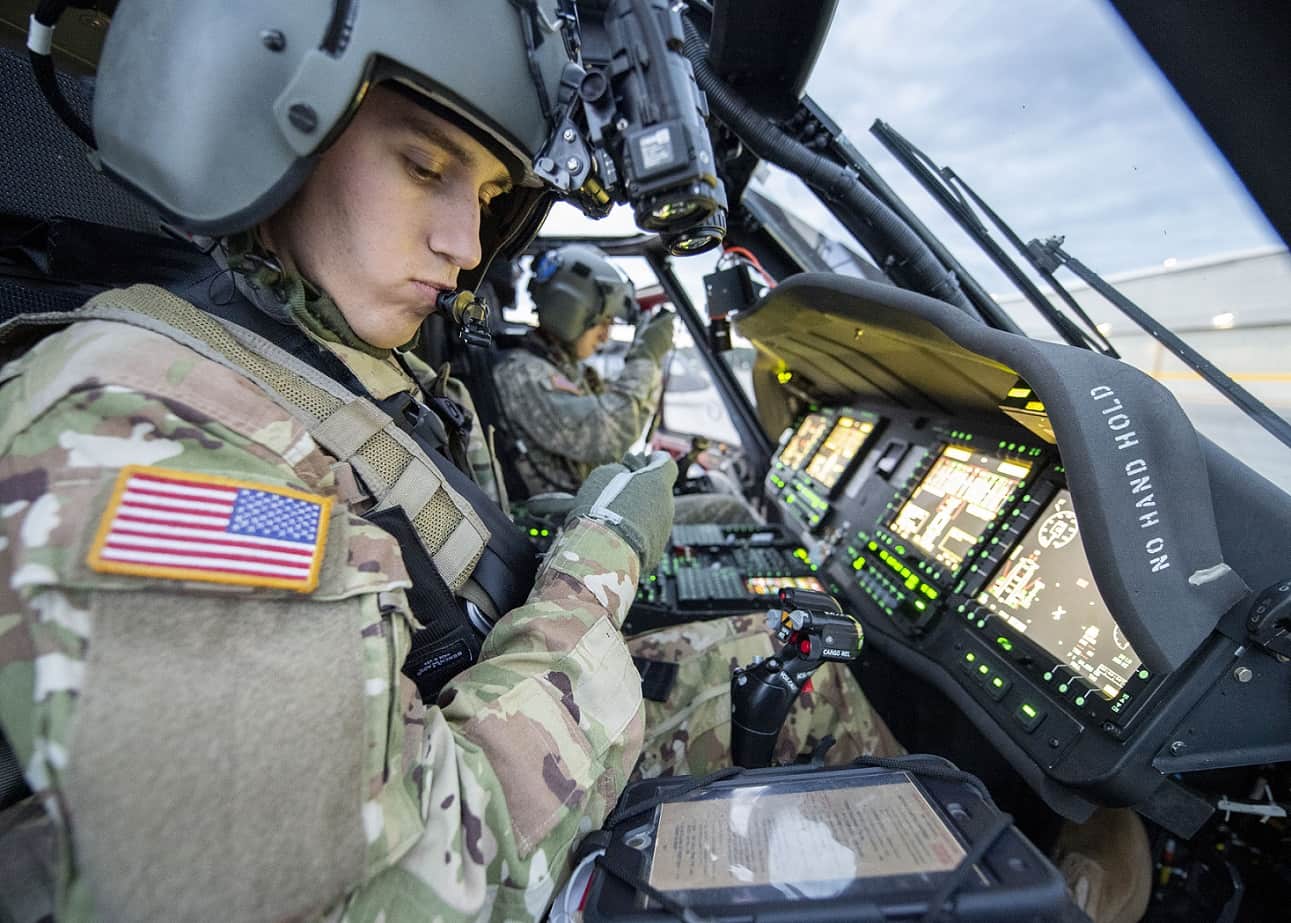U.S. Army test modernized UH-60V Black Hawk digital cockpit
Posted on
The U.S. Army has announced that combat Aviators are conducting operational tests of Army modernization efforts using three UH-60V Black Hawk helicopters.
According to a recent service news release, the UH-60V Black Hawk will retrofit the Army’s remaining UH-60L helicopter fleet’s analog cockpits with a digital cockpit, similar to the UH-60M helicopter.
Retrofitting aircraft that are already owned by the Army is a major cost saving measure over purchasing new builds, according to Mr. Derek Muller, UH-60V IOT Test Officer, with the West Fort Hood, Texas-based U.S. Army Operational Test Command’s Aviation Test Directorate.
Muller and his test team worked with aircrews from Company A, 2nd Battalion, 158th Aviation Regiment, 16th Combat Aviation Brigade by applying realistic operational missions, post-mission surveys and after action reviews along with onboard video and audio instrumentation to collect data directly from crewmembers.
Instrumentation installed by Redstone Test Center (RTC), Alabama provided audio, video and position data for test team to review after each mission.
“The OTC/RTC partnership has been paramount to the successful testing and evaluation of the UH-60V,” said Muller.
“The data collected during the test will support an independent evaluation by the U.S. Army Evaluation Center,” he added.
The evaluation will inform a full-rate production decision from the Utility Helicopter Program Office at Redstone Arsenal, Alabama.
Aircrews flew over 120 hours under realistic battlefield conditions.
They conducted air movement, air assault, external load and casualty evacuation missions under day, night, night-vision goggle, and simulated instrument meteorological modes of flight.
“Anti-aircraft weapon simulation emitters are a valuable training enabler and reinforce much of the Air Mission Survivability training assault aircrews have received with respect to operations in a threat environment,” said Capt. Scott Amarucci, A Co. 2-158 Company Commander.
“This approach permitted evaluators from the U.S. Army Evaluation Center to see and hear how a unit equipped with the UH-60V performed operational missions against a validated threat in a representative combat environment,” said Muller.
“The operational environment designed by USAOTC and 16th CAB helped evaluators accurately assess the company’s ability to complete doctrinal missions, when equipped with the UH-60V,” said Mr. Brian Apgar, Plans Deputy Division Chief of USAOTC AVTD.
The U.S. Army Center for Countermeasures employed three types of threat simulations to stimulate the aircraft’s survivability equipment and trigger pilot actions using the updated cockpit capabilities.
“The three independent threat simulation systems enhanced the quality of the test and enriched the combat-like environment,” said Muller.
“2-158th aircrews reacted to threat systems they rarely have the opportunity to encounter,” said Chief Warrant Officer 4 Toby Blackmon, Test Operations Officer in Charge, USAOTC AVTD.
“Using Blue Force Tracking, the test operations cell and Battalion Operations Center tracked and communicated with crews during missions,” he said.
“Each day I hear feedback from the crews about the testing,” said Lt. Col. Christopher Clyde, 2-158 BN Commander. “Each Soldier I talk to is glad to place a fingerprint on a future Army Aviation program.”
Aircrews executed their Mission Essential Task Lists using the UH-60V conducting realistic missions against accredited threat systems.
“The UH-60V training has allowed excellent opportunities to train important tasks which enable our proficiency as assault aviation professionals,” added Amarucci.
Testing at A Co.’s home station allowed the application of key expertise and resources, provided by the test team, while flying in its routine training environment.
New equipment collective training and operational testing caused A Co. to focus on several critical areas, including mission planning, secure communications, aircraft survivability equipment, and internal/external load operations, improving its overall mission readiness while meeting operational test requirements, according to Muller.
“Moreover,” Muller said, “the test’s rigorous operational tempo provided an ideal opportunity for 2-158th Aviation Regiment to exercise key army battle command systems including, but not limited to, Blue Force Tracker (BFT), secure tactical communications, and mission planning.”
Ground crews from the 1-2 Stryker Brigade Combat Team (SBCT) prepared and hooked up sling loads during 18 missions, allowing pilots to see how the UH-60V cockpit displays provided situational awareness while carrying an external load.
“Static load and external load training not only improved unit readiness, but fostered safe operations during day and night missions throughout the test,” said Sgt. 1st Class Jason Keefer, AVTD’s Test Non-Commissioned Officer in Charge.
Future operational testing will ensure Soldiers continue to have a voice in the acquisition process, guaranteeing a quality product prior to fielding.


Subscribe to our newsletter
Promotions, new products and sales. Directly to your inbox.
